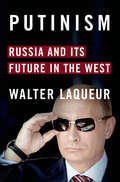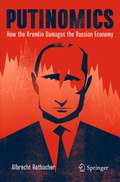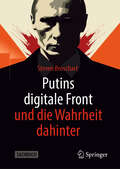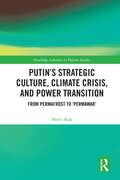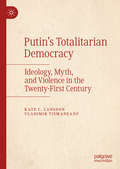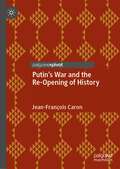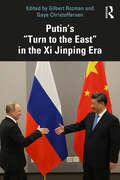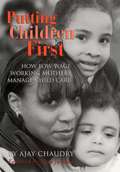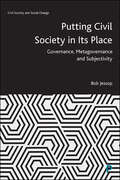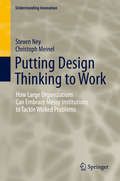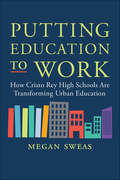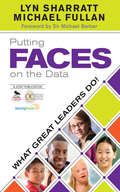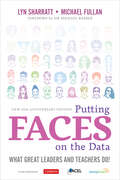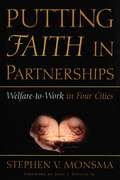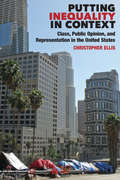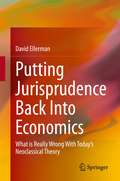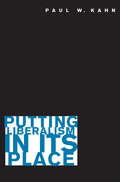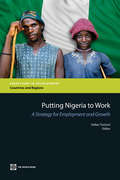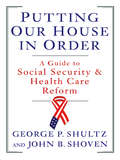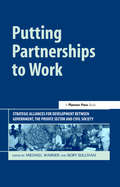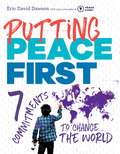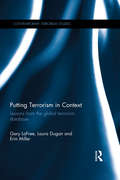- Table View
- List View
Putinism: Russia and Its Future in the West
by Walter LaqueurThere is no question that tensions between Russia and American are on the rise. The forced annexation of Crimea, the downing of Malaysia Airlines flight 17, and the Russian government's treatment of homosexuals have created diplomatic standoffs and led to a volley of economic sanctions. Much of the blame for Russia's recent hostility towards the West has fallen on steely-eyed President Vladimir Putin and Americans have begun to wonder if they are witnessing the rebirth of Cold War-style dictatorship.Not so fast, argues veteran historian Walter Laqueur.For two decades, Laqueur has been ahead of the curve, predicting events in post-Soviet Russia with uncanny accuracy. In Putinism, he deftly demonstrates how three long-standing pillars of Russian ideology: a strong belief in the Orthodox Church, a sense of Eurasian "manifest destiny" and a fear of foreign enemies, continue to exert a powerful influence on the Russian populous. In fact, today's Russians have more in common with their counterparts from 1904 than 1954 and Putin is much more a servant of his people than we might think.Topical and provocative, Putinism contains much more than historical analysis. Looking to the future, Laqueur explains how America's tendency to see Russia as a Cold War relic is dangerous and premature. As the situation in Ukraine has already demonstrated, Russia can and will challenge the West and it is in our best interest to figure out exactly who it is we are facing—and what they want—before it is too late.
Putinomics: How the Kremlin Damages the Russian Economy
by Albrecht RothacherThis book sheds new light on the political economy of Russia under Putin’s rule. The author, a former EU diplomat, presents a historical review of the Russian economy and 60 years of state-communist mismanagement, followed by oligarchic privatization. The book offers profound insights into Putin’s rule and the power mechanics of the state-dominated management of the Russian economy. It identifies and assesses the lack of rule of law, together with an arbitrary and often corrupt administration that systematically discourages entrepreneurship and the emergence of an independent middle class. Furthermore, the book discusses Russia’s budgetary policy, its dependence on the export of natural resources, state-owned enterprises and their privileges, and Russia’s external trade. This hard-hitting, substantial analysis debunks the myth of Russia’s economic might and is a must read for anyone seeking to understand the economic realities of the Eurasian continent, or considering doing business with Russia.
Putins digitale Front und die Wahrheit dahinter
by Steven BroschartPutins Krieg in der Ukraine wird nicht nur auf dem Schlachtfeld ausgetragen. Gekämpft wird auch an der digitalen Front. Worte und Informationen sind die Munition der modernen, der hybriden Kriegsführung - gegen das gegnerische Militär, aber insbesondere gegen Zivilisten. Es geht um Manipulation und Kontrolle. Um Verwirrung und Ablenkung von dem, was wirklich geschieht. Doch das Internet wird nicht nur zur Propaganda, sondern auch für die Aufklärung und die Logistik genutzt. Und dabei hinterlässt Russland eine Menge Spuren. Analyst Steven Broschart zeigt konkret, welche psychologischen und kommunikativen Mittel an Putins digitaler Frontlinie zum Einsatz kommen.
Putin’s Strategic Culture, Climate Crisis, and Power Transition: From Permafrost to 'Permawar' (Routledge Advances in Defence Studies)
by Mette SkakThis book offers a new perspective on the security policy of Russia, linking the Ukraine war with its climate policy and Putin’s strategic culture.It offers an analysis of Russian strategic culture, Putin’s strategic culture and operational code, as well as “Putinism” being the mental underpinning of Kremlin practices at home and abroad. The volume also addresses Russia’s evolution during Putin’s years in power and reflects upon Russia’s global standing, for example, with respect to China. The work stresses the dialectics between Russia’s ideational geopolitics and its climate policy and energy geo-economics, employing a broad approach to understanding security. A secondary analytical concern of the book is the implications and options of Putin’s code for European security and world order. The book offers a synthesis of various fields of research and draws on key works by other scholars to offer an overview of the evolving transition of the Russian state into climate denial and militarism.This book will be of much interest to students of Russian security policy, strategic culture, and international relations.
Putin’s Totalitarian Democracy: Ideology, Myth, and Violence in the Twenty-First Century
by Vladimir Tismaneanu Kate C. LangdonThis book studies the cultural, societal, and ideological factors absent from popular discourse on Vladimir Putin’s Russia, contesting the misleading mainstream assumption that Putin is the all-powerful sovereign of Russia. In carefully examining the ideological underpinnings of Putinism—its tsarist and Soviet elements, its intellectual origins, its culturally reproductive nature, and its imperialist foreign policy—the authors reveal that an indoctrinating ideology and a willing population are simultaneously the most crucial yet overlooked keys to analyzing Putin’s totalitarian democracy. Because Putinism is part of a global wave of extreme political movements, the book also reaffirms the need to understand—but not accept—how and why nation-states and masses turn to nationalism, authoritarianism, or totalitarianism in modern times.
Putin’s War and the Re-Opening of History
by Jean-François CaronThis book explores the emerging politics of Eurasia from the vantage point of Kazakhstan. Vladimir Putin’s decision to invade Ukraine in February 2022 has led to the end of the post-Cold War paradigm of liberal convergence and has triggered a geopolitical shift that will lead to the establishment of a renewed bipolar world order. However, if Russia is responsible for that shift, it will most likely not be the power that will be the leading force of the anti-Western bloc. The leading force of this emerging bloc will rather be China to which Russia is inevitably destined to be relegated as a junior partner in Beijing’s geopolitical orbit. This book, analyzing the geopolitics of a changing region, will interest scholars of international relations, Eurasia, and the economics of energy.
Putin’s “Turn to the East” in the Xi Jinping Era
by Gilbert Rozman Gaye ChristoffersenRozman, Christoffersen, and a team of expert contributors analyze the evolution of Vladimir Putin’s reorientation to Asia since 2012. When Putin announced a “Turn to the East” in Russian foreign policy upon his return to the presidency, this was to be strategic reorientation emphasizing multilateralism. As the years have passed, however, this has turned into a tight reliance on the bilateral relationship with China. Rozman, Christoffersen, and their team explore how the “Turn” proceeded and developed over the course of a decade, ending by examining the impact of the Ukraine war on Sino-Russian relations. Their analysis focuses on Russia’s perspective, taking into account an extensive range of Russian publications to look at how priorities shifted. While affirming the continued strengthening of ties between Beijing and Moscow, they identify many tensions between them, noting especially Russia’s illusions about the relationship. A comprehensive review of Russian policy toward the Indo-Pacific, which is essential reading for courses on Russian foreign policy and international relations in East Asia.
Putting Children First: How Low-Wage Working Mothers Manage Child Care
by Ajay ChaudryIn the five years following the passage of federal welfare reform law, the labor force participation of low-income, single mothers with young children climbed by more than 25 percent. With significantly more hours spent outside the home, single working mothers face a serious childcare crunch—how can they provide quality care for their children? In Putting Children First, Ajay Chaudry follows 42 low-income families in New York City over three years to illuminate the plight of these mothers and the ways in which they respond to the difficult challenge of providing for their children's material and developmental needs with limited resources. Using the words of the women themselves, Chaudry tells a startling story. Scarce subsidies, complicated bureaucracies, inflexible work schedules, and limited choices force families to piece together care arrangements that are often unstable, unreliable, inconvenient, and of limited quality. Because their wages are so low, these women are forced to rely on inexpensive caregivers who are often under-qualified to serve the developmental needs of their children. Even when these mothers find good, affordable care, it rarely lasts long because their volatile employment situations throw their needs into constant flux. The average woman in Chaudry's sample had to find five different primary caregivers in her child's first four years, while over a quarter of them needed seven or more in that time. This book lets single, low-income mothers describe the childcare arrangements they desire and the ways that options available to them fail to meet even their most basic needs. As Chaudry tracks these women through erratic childcare spells, he reveals the strategies they employ, the tremendous costs they incur and the anxiety they face when trying to ensure that their children are given proper care. Honest, powerful, and alarming, Putting Children First gives a fresh perspective on work and family for the disadvantaged. It infuses a human voice into the ongoing debate about the effectiveness of welfare reform, showing the flaws of a social policy based solely on personal responsibility without concurrent societal responsibility, and suggesting a better path for the future.
Putting Civil Society in Its Place: Governance, Metagovernance and Subjectivity (Civil Society and Social Change)
by Bob JessopRenowned social and political theorist Bob Jessop explores the idea of civil society as a mode of governance in this bold challenge to current thinking. Developing theories of governance failure and metagovernance, the book analyses the limits and failures of economic and social policy in various styles of governance. Reviewing the principles of self-emancipation and self-responsibilisation it considers the struggle to integrate civil society into governance, and the power of social networks and solidarity within civil society. With case studies of mobilisations to tackle economic and social problems, this is a comprehensive review of the factors that influence their success and identifies lessons for future social innovation.
Putting Design Thinking to Work: How Large Organizations Can Embrace Messy Institutions to Tackle Wicked Problems (Understanding Innovation)
by Christoph Meinel Steven NeyThis book discusses how the methods and mindsets of design thinking empower large organizations to create groundbreaking innovations. Arguing that innovations must effectively tackle so-called “wicked problems,” it shows how design thinking enables managers and innovators to create the organizational spaces and practices needed for breakthrough innovations. Design thinking equips actors with the tools and methods for harnessing the creative tensions inherent in pluralist, often conflicting disciplinary approaches. This, however, requires the transformation of contemporary organizational cultures away from monolithic, integrated models (or identities) toward more pluralist, dynamic and flexible institutional identities. Based on real-world cases from a wide range of organizations around the globe, the book offers managers and innovators practical guidance on initiating and managing the cultural transformations required for effective innovation.
Putting Education to Work: How Cristo Rey High Schools Are Transforming Urban Education
by Megan SweasThe story of how The Cristo Rey Network’s values-based education model and revolutionary work study program have improved urban schools and inspired education reform across the nation.Combining the latest advancements in instruction, a focus on spiritual values and character development, and an innovative work-study program, the Cristo Rey Network has reinvented urban education and revived a broken system. Catholic school for the twenty-first century, Cristo Rey offers underprivileged students the opportunities they deserve and the structure and committed teachers they need to succeed and build a better life.Filled with amazing stories of hardship and transformation, Putting Education to Work is a testimonial to the effectiveness of the Cristo Rey program, demonstrated through the lives of its students. Thanks to its rigorous college-prep curriculum and real-life job experience, students become “lifelong learners” who graduate with critical thinking skills and the experience needed for college and the work force. But the Cristo Rey education is not limited to the mind. Focusing on character growth, it ensures the formation of a “whole person” who understands his or her role in helping others.Presenting the lessons learned along the way, Putting Education to Work shows how any school—religious or secular—can benefit from the Cristo Rey model and offers a hopeful outlook of what young people and determined educators can achieve together.
Putting FACES on the Data: What Great Leaders Do!
by Michael Fullan Lyn D. SharrattBuild the bridge from data collection to improved instruction Students are people—not data. How can you use assessment data to focus on reaching every student? This book shows how to develop a common language for sharing all students’ progress with all teachers and leaders, and how to use ongoing assessment to inform instruction. Based on worldwide research of more than 500 educators, the book presents solutions organized by: Assessment Instruction Leadership Ownership The many benefits of personalizing data include increased student engagement and a positive impact on school culture. This reader-friendly guide helps you set goals, adjust lessons, identify students’ strengths and weaknesses, and implement interventions.
Putting FACES on the Data: What Great Leaders and Teachers Do!
by Michael Fullan Lyn D. SharrattWhen numbers become people, learners thrive Waves of data—indigestible, dehumanized, and disaggregated—are crashing into the education system every day, driving you to distraction. But imagine a world where you’re not being drowned by data, but inspired by it; where that data has a FACE and gives you focused information on how to reach every student. Sharratt and Fullan turn worldwide research into a road map for school leaders to use ongoing assessment to inform instruction and drive equity at the classroom, school, district, and state levels. Inside you will find A fresh look at data to incorporate new learning Updated case studies, figures, and vignettes Insights from more than 500 educators in answering the 3 research questions: Why do we put FACES on data? How do we put FACES on data? and What are the top three leadership skills needed to do this work? An integrated approach to using the 14 Parameters to enhance Deep Learning and critical thinking Tools for committing to "equity and excellence" FACES is about setting up the conditions for success in every classroom: identifying the right factors, at the right time, with the right resources. Its focus on student-centered data will help you: Increase learners’ growth and achievement improve engagement that results in students, teacher and leader empowerment build cultures of learning drive a learning environment of continuous improvement
Putting FACES on the Data: What Great Leaders and Teachers Do!
by Michael Fullan Lyn D. SharrattWhen numbers become people, learners thrive Waves of data—indigestible, dehumanized, and disaggregated—are crashing into the education system every day, driving you to distraction. But imagine a world where you’re not being drowned by data, but inspired by it; where that data has a FACE and gives you focused information on how to reach every student. Sharratt and Fullan turn worldwide research into a road map for school leaders to use ongoing assessment to inform instruction and drive equity at the classroom, school, district, and state levels. Inside you will find A fresh look at data to incorporate new learning Updated case studies, figures, and vignettes Insights from more than 500 educators in answering the 3 research questions: Why do we put FACES on data? How do we put FACES on data? and What are the top three leadership skills needed to do this work? An integrated approach to using the 14 Parameters to enhance Deep Learning and critical thinking Tools for committing to "equity and excellence" FACES is about setting up the conditions for success in every classroom: identifying the right factors, at the right time, with the right resources. Its focus on student-centered data will help you: Increase learners’ growth and achievement improve engagement that results in students, teacher and leader empowerment build cultures of learning drive a learning environment of continuous improvement
Putting Faith in Partnerships: Welfare-to-Work in Four Cities
by Stephen V. MonsmaPutting Faith in Partnerships addresses a major conceptual change in American domestic policy, begun by Reagan and now fully realized by the Bush administration: the shift of responsibility for social services from the federal government to states and communities. In this groundbreaking study of a politically controversial topic---the debut offering in Alan Wolfe's Contemporary Political and Social Issues series---author Stephen Monsma avoids overheated rhetoric in favor of a careful, critical analysis of the hard evidence on whether public-private partnerships really work. The book is based on in-depth studies of social service programs in Los Angeles, Chicago, Philadelphia, and Dallas. By examining public-private partnerships between government offices and nonprofit organizations, Monsma seeks to understand how these partnerships affect the balance between government's efforts to deal with social problems and the rights of individual citizens to control their own lives.
Putting Inequality in Context: Class, Public Opinion, and Representation in the United States
by Christopher EllisRising income inequality is highlighted as one of the largest challenges facing the United States, affecting civic participation and political representation. Although the wealthy often can and do exert more political influence, this is not always the case. To fix political inequality, it is important to understand exactly how class divisions manifest themselves in political outcomes, and what factors serve to enhance, or depress, inequalities in political voice. Christopher Ellis argues citizens’—and legislators’—views of class politics are driven by lived experience in particular communities. While some experience is formally political, on an informal basis citizens learn a great deal about their position in the broader socioeconomic spectrum and the social norms governing how class intersects with day-to-day life. These factors are important for policymakers, since most legislators do not represent “the public” at large, but specific constituencies. Focusing on U.S. congressional districts as the contextual unit of interest, Ellis argues individuals’ political behavior cannot be separated from their environment, and shows how income’s role in political processes is affected by the contexts in which citizens and legislators interact. Political inequality exists in the aggregate, but it does not exist everywhere. It is, rather, a function of specific arrangements that depress the political influence of the poor. Identifying and understanding these factors is a crucial step in thinking about what reforms might be especially helpful in enhancing equality of political voice.
Putting Jurisprudence Back Into Economics: What is Really Wrong With Today's Neoclassical Theory
by David EllermanThis book presents an integrated jurisprudential critique of neoclassical microeconomic theory. It explains what is ‘really wrong’ with the theory both descriptively, as well as normatively. The criticism presented is based on questions of jurisprudence, and on neoclassical theory’s sins of omission and commission concerning the underlying system of property and contract. On the positive side - while the presentation is almost entirely non-mathematical - the book contains the first mathematical treatment of the fundamental theorem about property and contract in jurisprudence that underlies a market economy.The book follows the tradition of John Stuart Mill as the last major political economist who considered the study of property rights as an integral part of economic theory. The conceptual criticisms presented in this book focus on the descriptive and normative misconceptions about property and contracts that are deeply embedded ideology in neoclassical economics, not to mention in the broader society. The book recognizes that the idealized microeconomic theory is not descriptive of reality and focuses its criticism on conceptual mistakes in the theory, which are even clearer due to the idealized nature of the theory. Therefore, the book is a must-read for scholars, researchers, and students interested in a better understanding of jurisprudence in economics, neoclassical microeconomic theory, and political economy in general.
Putting Liberalism in Its Place
by Paul W. KahnIn this wide-ranging interdisciplinary work, Paul W. Kahn argues that political order is founded not on contract but on sacrifice. Because liberalism is blind to sacrifice, it is unable to explain how the modern state has brought us to both the rule of law and the edge of nuclear annihilation. We can understand this modern condition only by recognizing that any political community, even a liberal one, is bound together by faith, love, and identity. Putting Liberalism in Its Place draws on philosophy, cultural theory, American constitutional law, religious and literary studies, and political psychology to advance political theory. It makes original contributions in all these fields. Not since Charles Taylor's The Sources of the Self has there been such an ambitious and sweeping examination of the deep structure of the modern conception of the self. Kahn shows that only when we move beyond liberalism's categories of reason and interest to a Judeo-Christian concept of love can we comprehend the modern self. Love is the foundation of a world of objective meaning, one form of which is the political community. Arguing from these insights, Kahn offers a new reading of the liberalism/communitarian debate, a genealogy of American liberalism, an exploration of the romantic and the pornographic, a new theory of the will, and a refoundation of political theory on the possibility of sacrifice. Approaching politics from the perspective of sacrifice allows us to understand the character of twentieth-century politics, which combined progress in the rule of law with massive slaughter for the state. Equally important, this work speaks to the most important political conflicts in the world today. It explains why American response to September 11 has taken the form of war, and why, for the most part, Europeans have been reluctant to follow the Americans in their pursuit of a violent, sacrificial politics. Kahn shows us that the United States has maintained a vibrant politics of modernity, while Europe is moving into a postmodern form of the political that has turned away from the idea of sacrifice. Together with its companion volume, Out of Eden, Putting Liberalism in Its Place finally answers Clifford Geertz's call for a political theology of modernity.
Putting Nigeria to Work: A Strategy for Employment and Growth
by Volker TreichelPublic debate in Nigeria on the country's progress since its return to democracy in 1999 has been dominated by two seemingly opposite themes. The first theme is the strong growth performance of the non-oil economy. This success has been marked by sharp increases in agriculture, trade, and construction and by the emergence of new industries in the financial, telecommunications, and entertainment sectors, supported by sound macroeconomic policies and structural reforms. The second, opposing theme is the seeming failure of Nigeria's much improved economic performance to reduce unemployment, especially among the young. Rising levels of unemployment have increased militancy among the young and impacted negatively on public order. 'Putting Nigeria to Work: A Strategy for Employment and Growth' looks at the ways in which Nigeria's improved economic performance has impacted the labor market. A number of relevant factors are carefully examined and analyzed, including industrial policy and the investment environment, the effects of restrictive trade policies on growth, and the ability of the technical and vocational education system to address the country's skills gap. The book proposes a strategy that will allow Nigeria to increase the availability of quality jobs, reduce rising youth unemployment, and sustain and further accelerate the country's economic performance and growth. At the core of this strategy are targeted interventions aimed at removing binding constraints to growth in sectors of the economy that are already growing fast, but have the potential to grow faster and have significant employment-creating potential.
Putting Our House in Order: A Guide to Social Security and Health Care Reform
by George P. Shultz John B. ShovenA former U.S. Secretary of the Treasury and an eminent economist tackle the biggest social issue of our time. Of all the issues swirling around the 2008 election, the staggering projected costs for the upkeep of America's largest entitlement programs--Social Security, Medicare, and Medicaid--loom with gathering intensity. Government revenues alone cannot solve the problem, but a solution must be found. In this book George P. Shultz and John B. Shoven take a practical--and optimistic--look at the issues at hand, offering an agenda for reform that will make these essential programs solvent. Drawing on a trove of original research, they take stock of the current situation, consider plans on offer from major thinkers in the field, and chart a course toward a system that provides income for the elderly and universal access to health care in ways that are fiscally sound. This book is a must-read for anyone looking to make an informed decision about the country's future.
Putting Partnerships to Work: Strategic Alliances for Development between Government, the Private Sector and Civil Society
by Michael Warner Rory SullivanThe World Summit on Sustainable Development in Johannesburg clearly identified the corporate sector as one of the key actors in the delivery of national and international poverty reduction targets in developing countries. "Partnerships" between government, civil society and business were proposed as one means whereby these poverty reduction targets were to be achieved. Despite the rhetoric, there was less consideration of how such partnerships could work in practice, the outcomes that could be achieved, or the relative merits of partnerships over other, more traditional approaches to development. This book is about partnerships between the private sector, government and civil society. Its objective is to share practical experiences in establishing and implementing such partnerships and to show how partnerships work. The focus is on the oil, gas and mining industries, as these sectors have tended to be the primary drivers of foreign investment in developing countries. These corporations increasingly operate in regions characterised by poor communities and fragile environments. The more effective use of external relationships to ensure the effective contribution of these investments to poverty reduction and local environmental management is critical, for the companies, for government, and for the poor. Putting Partnerships to Work is based on the work of the Secretariat of the Natural Resources Cluster (NRC) of Business Partners for Development (BPD). This major research programme, which ran from 1998 to 2002, aimed to enhance the role of oil, gas and mining corporations in international development. The programme objective was to produce practical guidance, based on the experience of specific natural resource operations around the world, on how partnerships involving companies, government authorities and civil-society organisations can be an effective means of reducing investment risks and of promoting community and regional development. The programme encompassed partnerships in Colombia, Nigeria, India, Venezuela, Bolivia, Zambia, Azerbaijan, Indonesia and Tanzania. The specific projects that were implemented included not only "traditional" development projects such as the provision of water, healthcare or infrastructure but also themes as diverse as conflict prevention, regional development, micro-enterprise development and managing oil spill compensation. Based on the experience of establishing and implementing effective partnerships, the NRC identified good practice, and developed replicable guidelines, tools and training materials. This book is not only about good practice; it presents both the positive outcomes and lessons from the programme, as well as the risks and costs, and where things went wrong. It also provides evidence not only of the viability of partnerships (i.e. that partnerships "can work") but also evidence that partnership approaches can provide substantially better outcomes for all parties than can more traditional approaches to development or corporate social responsibility. For example, a road in India was constructed at 25% of the cost to government; it took just 11 months for a community health centre in Venezuela to become operational and with its long-term financial future assured; and primary education enrolment rates in the vicinity of a gold mine in Tanzania have jumped from a historic level of 60–80% to almost 100% (as a consequence of improved infrastructure and community awareness of the importance of education). These development and public-sector benefits have been accompanied by substantial business benefits, including significant reductions in the cost of community development initiatives and/or the leverage of additional resources, greater sustainability and viability of development projects and significant improvements to corporate reputation and their local "social licence to operate" with communities. The book argues that to achieve these benefits requires all parties to invest time and effort in first exploring the best design for the partnership, unde
Putting Peace First: 7 Commitments to Change the World
by Eric DawsonYoung people are hungry to change the world, but often aren't given the chance. This book empowers them to make change happen.When he was just eighteen, Eric David Dawson co-founded the non-profit Peace First based on the idea that young people can change the world for the better--not someday, but right now. Twenty-five years later, Peace First has reached millions worldwide, teaching young people how to become peacemakers and create real change. Now, Dawson has written PUTTING PEACE FIRST, the handbook every aspiring peacemaker needs. Using the inspiring stories of real life peacemakers, each chapter highlights a different aspect of peacemaking, from Opening Your Heart to Taking a Stand. With clear, step-by-step explanations of how each peacemaker achieved their goals, this book is a guide for anyone who wants to make a difference.
Putting Social Movements in Their Place
by Doug Mcadam Hilary Schaffer BoudetThe field of social movement studies has expanded dramatically over the past three decades. But as it has done so, its focus has become increasingly narrow and 'movement-centric'. When combined with the tendency to select successful struggles for study, the conceptual and methodological conventions of the field conduce to a decidedly Ptolemaic view of social movements: one that exaggerates the frequency and causal significance of movements as a form of politics. This book reports the results of a comparative study, not of movements, but of communities earmarked for environmentally risky energy projects. In stark contrast to the central thrust of the social movement literature, the authors find that the overall level of emergent opposition to the projects has been very low, and they seek to explain that variation and the impact, if any, it had on the ultimate fate of the proposed projects.
Putting Terrorism in Context: Lessons from the Global Terrorism Database (Contemporary Terrorism Studies)
by Gary LaFree Laura Dugan Erin MillerThis book offers a guide to interpreting available statistical data on terrorism attacks around the world. The Global Terrorism Database (GTD) now includes more than 113,000 terrorist attacks, starting in 1970. By analyzing these data, researchers demonstrate how a very small number of terrorist attacks have had an outsized effect on attitudes and policies toward terrorism. These attacks, referred to as ‘black swan’ events, are difficult to predict but have an enormous impact on human affairs for years to come. The book discusses terrorist attacks, such as 9/11, possibly the most high profile ‘black swan’ event in living memory, by putting them into context with thousands of less publicized attacks that have plagued the world since 1970. Historically, the study of terrorism has suffered from a general lack of empirical data and statistical analysis. This is largely due to the difficulty of obtaining valid data on a topic that poses significant collection challenges. However, this book makes use of the fact that the GTD is currently the most extensive unclassified database on terrorism ever collected. While there have been summaries of the research literature on terrorism and important analyses of international terrorism event data, this is the first book that provides a comprehensive empirical overview of the nature and evolution of both modern international and domestic terrorism. This book will be of interest to students of terrorism and political violence, criminology, international security, and political science in general.
Putting the Parts Together: Trade, Vertical Linkages, and Business Cycle Comovement
by Andrei A. Levchenko Julian Di GiovanniA report from the International Monetary Fund.
